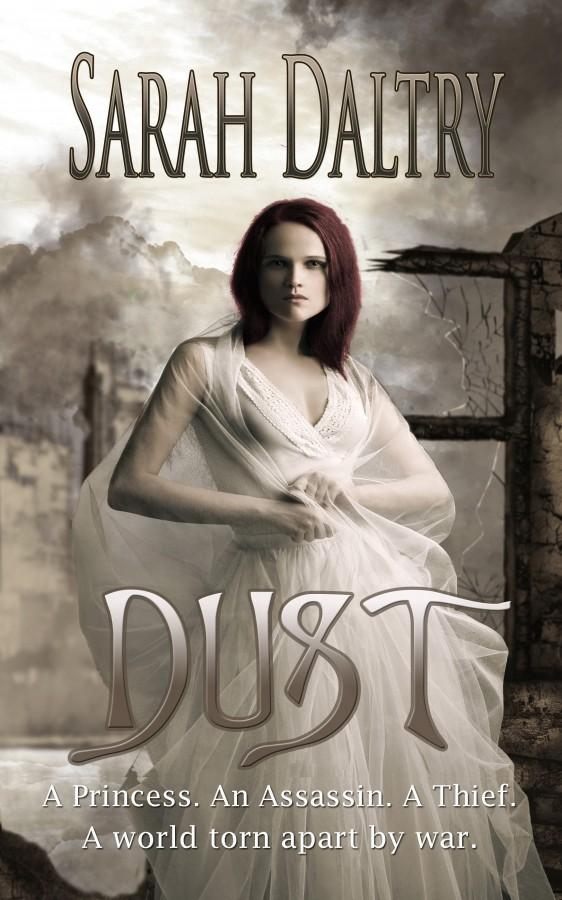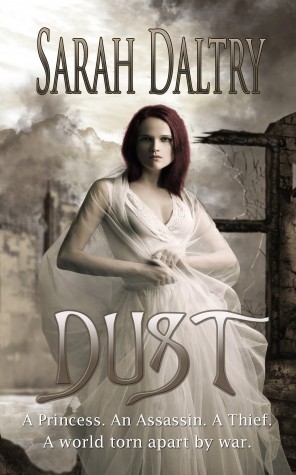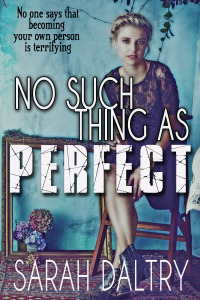Sarah Daltry writes for the college crowd
Author Sarah Daltry writes books about college students, for college students.

Alondra is the princess of a war-torn kingdom, and when she falls in love with a dangerous stranger, she begins to uncover dark secrets about her kingdom that she never expected.
October 15, 2014
Unfortunately, there aren’t many books aimed at college readers that focus on actual college situations. Most are either Young Adult (YA) with a clichéd love triangle theme or completely romance-centered with little to no plot. Luckily, author Sarah Daltry is charting new territory by writing college-themed books that focus less on romance and more on plot. Her books include Backwards Compatible, a gamer geek comedy, The Love Song of J. Alfred Prufrock, a novella based on the Eliot poem’s themes, and Bitter Fruits, a paranormal romance. Also, her upcoming fantasy novel, Dust, is set to be released in November. Daltry explained that she got started writing romance novels but grew dissatisfied with the genre.
“I started in romance, and I’m not really sure how I got into that genre because I don’t read romance myself. I wrote contemporary new adult with romance, which were about issues that college kids or young adults dealt with, but that didn’t do very well with either genre, because college kids weren’t as interested in the romance aspect and romance fans didn’t want to read about some kid being homesick—they wanted me to get to the romance already. Right now I mainly write in contemporary YA,” Daltry explained.
Some writers like to write with a set plot in mind, but Daltry said she tends to focus on specific characters instead of the overall plot.
“My writing is very character-driven, so I think of a character and imagine what they would do in certain situations and go from there. For certain books, like mystery books, I need to use an outline… I’d love to write a mystery, but I’m terrible at them. I’d give it all away in the first five pages. But normally I can’t do outlines; I’m not a planner.”
Daltry admitted that revising is a bit of a challenge for her, since she tries to get each scene exactly how she wants it before she moves forward. She added that one of her biggest challenges is overcoming any doubts about her work’s quality.
“I tend to get stuck on one scene, and work on the same scene over and over, to see if I could do more with it or fix certain pieces. I can’t move on or move past that until I’m satisfied with it…[The most challenging thing is staying] satisfied with what you’ve written. You can’t look at negative reviews; just because someone doesn’t get the message of your book doesn’t mean that your book is terrible. Like for me, I hated Hemingway until I read The Sun Also Rises, and I probably would’ve given his books one-star reviews just because I didn’t like them.”
Since she started writing, Daltry’s novels have come a long way, and she credits that to not dwelling over other people’s perceptions of her writing and instead concentrating on what she wants to say.
“The first novel I wrote doesn’t see many eyes. There’s a lot of pressure to appeal to certain markets, and make your characters appeal to other people, but when you do that they become unappealing to yourself, and your characters become other people’s characters,” she noted.
Sarah Daltry is currently rewriting her Flowering series and is also working on a dystopian novel set in London. Her books can be found on Amazon, as eBooks and online at sarahdaltry.com.
Excerpts from Sarah Daltry’s books:
DUST

Alondra is the princess of a war-torn kingdom, and when she falls in love with a dangerous stranger, she begins to uncover dark secrets about her kingdom that she never expected.
He leads me to a glass tower by the port. The sun reflects off of it, making it hard to see where we’re going. Boats are moored and it appears that no one is working today. I suppose an announcement like ours is cause for a day off. There are probably also great numbers of things to do in order to throw a party for us. All I have heard about from my mother is how important my behavior will be.
The pneumatic lift brings us to the height of the tower and I realize before we are even inside that the tower is not a tower at all; it is a lighthouse. A large crystal gate encircles the apex, and in the middle stands a massive flame. Magic flame is colorless, but changes according to need; the flame will glow yellow for incoming ships or traders; blue welcomes friends and guests; and red indicates danger. Red is rare in Demoria, for by the time the flame thinks about turning red, the assassins have extinguished the threat.
From here, the view is like something I dreamed of as a child. Ceaseless azure leads to the ends of the earth. The sun sparkles off the waves; the air feels cleaner. Behind us, the city of Demoria looms and I understand why the Demorians were the natural choice for our protectorate. Black and steel eviscerate the sky. Everything here is built upwards rather than outwards. You could walk the entire length of the city in an hour or so, but it would take weeks to reach the heights of each structure. Jutting angles and jagged edges are the architecture of choice. It is in such contrast to Kooram, a village of rocks and stones, winding pathways, little cafes, and willow trees. For a moment, I feel sadness for Seamus. Imagine growing up with no color, with no beauty.
“This will be yours too someday,” he says. The sadness I felt passes, crushed by the instinctual resentment.
“I thought we would stay in Kooram,” I reply.
“We can spend time in both places,” he offers in concession.
“Or I could stay in Kooram and you could stay here and we can just send each other letters,” I suggest.
“Cute.” He is undeterred. “Come with me; there is so much more to show you.”
We tour all of the highlights of Demoria, but nothing makes me like it more. Many of the places, in fact, make me exponentially more displeased about the future. It is a city of efficiency, a cold city that does not live so much as it survives. I know all of the beauty of the city was destroyed in the Wars, but rather than allow anyone to breathe life back into it, the city became a chamber for the present, where the past and the future were abolished. The only part of it that makes sense to me is how it appears at night. The obsidian buildings against the dark sky make the city invisible. Heavy two-sided glass allows the interiors to be illuminated, but nothing streams out to the streets. Unless you are on a trading ship waiting for the yellow flame, you would never know Demoria exists.
NO SUCH THING AS PERFECT

Lily Drummond has been a perfectionist for her entire life, but once she goes away to college, things aren’t quite falling into place. With the help of a friend, Lily might just realize that perfect isn’t everything.
I hate the fall. Now that the weather has finally caught up, it’s freezing and all the trees are bare. It’s only been a few days since I got back and yet fall just came in, blanketed the entire world in death, and then left things for us to mourn.
“You mind company?” Campus is dark but I don’t have to turn around to recognize his voice. I don’t stop walking and I don’t turn around, but I shake my head as invitation.
“Fall is so depressing,” he says when he’s beside me. “Do we need an annual ceremony to remind us that everything ends?”
“I was just thinking the same thing.”
We walk around the quad, not speaking, but it’s pleasant. There’s a faded light in the library windows and music is playing from some of the dorms, but it’s all away. Both physically distant and almost surreal. For nearly thirty minutes, we just walk, our breath meeting the chill in the air and the only sounds outside of the echoes of dorm life our shoes on the crunchy remnants of leaves.
“What brings you out here?” he finally asks, after we’ve circled the quad several times, but it’s a question with no timeline. It takes another circle before I reply.
“I don’t know. I’m just walking. I screwed up a paper and I don’t know how to fix it and things just all seem to feel like they’re out of control,” I explain.
“You really do put a lot of stock in rules, don’t you?”
I nod, but he catches it because he’s looking. I like the way he looks at me. It’s a curious look, but I’ve been struck before by his eyes and the depth of them that when he looks at me, I feel complex. Jack also has a sincerity in his look and I can’t remember when – or if – someone looked at me like that last.
“What happens if you break them?” he asks.
“I don’t.”
“But if you did?”
I stop, the leaves resistant to my feet digging them into dust, and look away from the buildings with life in them, towards one of the academic halls that rests in darkness with only a sole security light to give it presence. I really hate the fall, because the smell of wood smoke and the crispness of cold make me want to love it. I want to picture Halloween and childhood and fireplaces and cocoa, but all I can think about is the fact that even the trees know nothing is permanent.
“When I was a kid, before… well, when I was really young, I loved to play in the woods,” I say. “There was a massive forest behind my house. I mean, it probably wasn’t massive at all, but when I was five, it felt it. My brother was just my brother and I wasn’t a girl and he wasn’t a boy and no one cared about appearances and rules. We used to stay out in the woods until it got dark – and then we would stay longer, just to see if we could. There was one night my dad came to get us, during the summer, and it was after dinner and his flashlight was the only thing that made the woods real, part of this world. I lived in my imagination in those woods and everything was possible.”
Jack sits on the curb under the streetlight, but doesn’t interrupt. I join him, the cold concrete sneaking past my jeans, but it keeps me grounded. Memory feels a little too strong tonight. Fall does that.
“Eventually, I was told I couldn’t go in the woods, because girls didn’t do that and girls wore dresses and sat quietly and they behaved and they followed the rules.”
“That’s stupid,” Jack says.
I laugh and it feels good. I can’t remember the last time I laughed so naturally. “It is. But that’s not the story.”

